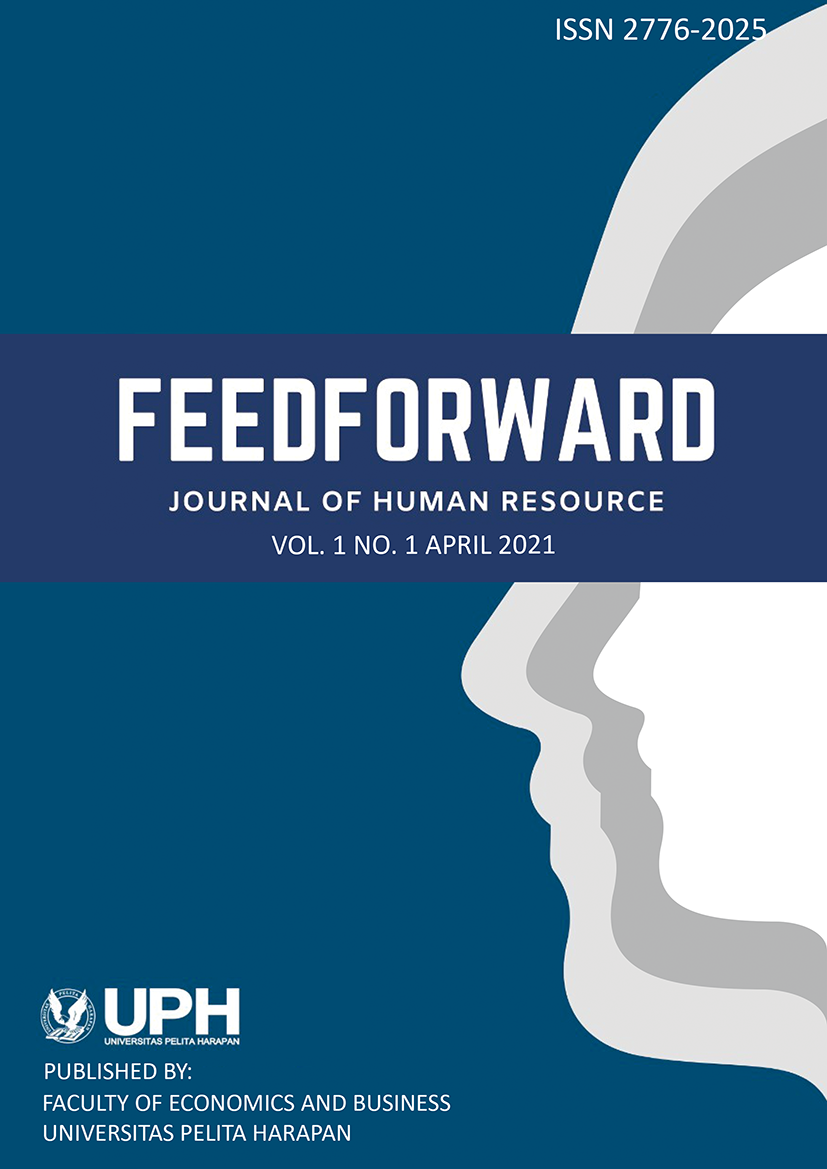Pengaruh Kepuasan Kerja Terhadap Turnover Intention Cabin Crew Maskapai X dengan Organizational Commitment dan Intent to Stay Sebagai Variabel Mediasi [Effect of Job Satisfaction on Turnover Intention of Airline Crew on X Airline with Organizational Commitment and Intent to Stay as the Mediating Variable]
##semicolon##
https://doi.org/10.19166/ff.v1i1.3414##semicolon##
kepuasan kerja##common.commaListSeparator## turnover intention##common.commaListSeparator## organizational commitment##common.commaListSeparator## intent to stay##common.commaListSeparator## job satisfaction초록
This study was conducted to determine the effect of job satisfaction on the turnover intention of airline crew on X airline with organizational commitment and intent to stay as the mediating variable. This study uses a quantitative method, using convenience sampling technique to determine the sample of airline X airline cabin crew throughout Indonesia who are still actively contracted and working for airline X, this airline is under the auspices of PT Lion Mentari Airlines. There were 85 cabin crew whose data were successfully collected through a questionnaire distributed on google form. The data that has been collected is processed with PLS SEM using program SmartPLS software. The results showed that job satisfaction has an influence on organizational commitment, organizational commitment has an influence on intent to stay, job satisfaction has an influence on turnover intention, and job satisfaction has an influence on turnover intention of airline crew cabin X with organizational commitment and intent to stay as the mediating variable. The managerial implication of this research suggests that airline X can make efforts to improve cabin crew job satisfaction in order to increase organizational commitment and intent to stay and reduce the turnover intention of cabin crew.
BAHASA INDONESIA ABSTRACT:
Penelitian ini dilakukan untuk mengetahui pengaruh kepuasan kerja terhadap turnover intention cabin crew maskapai X dengan organizational commitment dan intent to stay sebagai variabel mediasi. Penelitian ini menggunakan metode kuantitatif, dengan menggunakan teknik convenience sampling untuk penentuan sampel kepada para cabin crew maskapai penerbangan X di seluruh Indonesia yang masih aktif dikontrak dan bekerja di maskapai penerbangan X. Maskapai ini berada di bawah naungan PT Lion Mentari Airlines. Terdapat 85 cabin crew yang berhasil dikumpulkan datanya melalui kuesioner yang disebar dengan google form. Data yang telah dikumpulkan diolah dengan alat statistik PLS-SEM dengan program SmartPLS. Hasil penelitian menunjukkan bahwa kepuasan kerja memiliki pengaruh terhadap organizational commitment, organizational commitment memiliki pengaruh terhadap intent to stay, kepuasan kerja memiliki pengaruh terhadap turnover intention, dan kepuasan kerja memiliki pengaruh terhadap turnover intention cabin crew maskapai penerbangan X dengan organizational commitment dan intent to stay sebagai variabel mediasi. Implikasi manajerial dari penelitian ini disarankan maskapai X dapat melakukan upaya untuk meningkatkan kepuasan kerja cabin crew supaya dapat meningkatkan organizational commitment dan intent to stay serta mengurangi tingkat turnover intention dari cabin crew.
##submission.citations##
Anderson, L. E. (2015). Relationship between leadership, organizational commitment, and intent to stay among junior executives [Doctoral dissertation, Walden University]. Walden Dissertations and Doctoral Studies Collection. https://scholarworks.waldenu.edu/dissertations/1184/
bps.go.id (2020). Retrieved November 6, 2020 from https://bps.go.id
ditjenbinaadwil.kemendagri.go.id (2020). Retrieved September 5, 2020, from https://ditjenbinaadwil.kemendagri.go.id
Ghozali, I., & Latan, H. (2015). Partial Least Squares, konsep, teknik dan aplikasi menggunakan program Smartpls 3.0 untuk penelitian empiris. Badan Penerbit Universitas Diponegoro.
Hidayat, A. S. (2018). Pengaruh kepuasan kerja terhadap komitmen organisasi dan turnover intention. Jurnal Manajemen dan Pemasaran Jasa, 11(1), 51-66. https://doi.org/10.25105/jmpj.v11i1.2516
Jou, R. -C., Kuo, C. -W., & Tang, M. -L. (2013). A study of job stress and turnover tendency among air traffic controllers: The mediating effects of job satisfaction. Transportation research part E: logistics and transportation review, 57, 95-104. https://doi.org/10.1016/j.tre.2013.01.009
lionair.co.id (2020). Retrieved August 29, 2020, from https://www.lionair.co.id
Musoli, Pratiwi, W., & Syaputra, A. (2018). Stres kerja terhadap kinerja cabin crew. Jurnal Manajemen Dirgantara, 11(2), 88-92. https://jurnal.sttkd.ac.id/index.php/jmd/article/view/82
Noe, R. A., Hollenbeck, J. R., Gerhart, B. A., & Wright, P. M. (2016). Fundamentals of human resource management. McGraw-Hill Higher Education.
Robbins, S. P., & Judge, T. A. (2017). Organizational behavior. Pearson.
Vong, L. T. -N., Ngan, H. F. B., & Lo, P. C. -P. (2018). Does organizational climate moderate the relationship between job stress and intent to stay?. Journal of Chinese Human Resource Management, 9(1), 2-20. https://doi.org/10.1108/JCHRM-09-2017-0022
Youcef, S., Ahmed, S. S., & Ahmed, B. (2016). The impact of job satisfaction on turnover intention by the existence of organizational commitment, and intent to stay as intermediates variables using approach PLS in sample worker department of transport Saida. Management, 6(6), 198-202. http://article.sapub.org/10.5923.j.mm.20160606.03.html
Yücel, İ. (2012). Examining the relationships among job satisfaction, organizational commitment, and turnover intention: An empirical study. International Journal of Business and Management, 7(20), 44-58. https://doi.org/10.5539/ijbm.v7n20p44
##submission.downloads##
출판됨
권
세션
##submission.license##
Authors who publish with this journal agree to the following terms:
1) Authors retain copyright and grant the journal right of first publication with the work simultaneously licensed under a Creative Commons Attribution License (CC-BY-SA 4.0) that allows others to share the work with an acknowledgement of the work's authorship and initial publication in this journal.
2) Authors are able to enter into separate, additional contractual arrangements for the non-exclusive distribution of the journal's published version of the work (e.g., post it to an institutional repository or publish it in a book), with an acknowledgement of its initial publication in this journal.
3) Authors are permitted and encouraged to post their work online (e.g., in institutional repositories or on their website). The final published PDF should be used and bibliographic details that credit the publication in this journal should be included.


